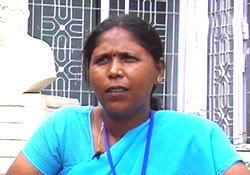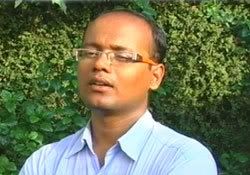 Usha Chomar is just one of the 3, 40,000 toilet cleaners in India. Born in deprivation, living in neglect but with a for upliftment. This is her story and many like her.
Usha Chomar is just one of the 3, 40,000 toilet cleaners in India. Born in deprivation, living in neglect but with a for upliftment. This is her story and many like her.The word 'scavenger' has two different connotations. The first - Any animal that feeds on refuse and other decaying organic matter. And the second - Someone who collects things that have been discarded by others. It is sadly the second that is the kismet of many women (and kids) in India. Coming from the least economically privileged part of India's society they grow up with the sobriquet 'untouchables'. It is as damning for them as it is for the race which calls itself humans.
But this week some 36 of such women made there way from the bylanes of India to the ramps of New York. They sashayed down the catwalk alongside professional models in a display of recognition and respect courtesy the United Nations. The 36 women are special invitees at the conference to mark the UN's International Year of Sanitation. The special fashion show, Mission Sanitation was part of the U.N Program. The women walked the ramp with models who wore some of the clothes stitched by these workers.
For 36 year old Usha Chomar this was a memorable experience. Though she gave up scavenging three years ago, the memories of her own personal struggle are fresh.
"I have always done the work of scavenging and have faced humiliation all my life."
But with the offbeat 'recognition' given to her by the U.N, she felt finally respected...and like a human. Usha feels that if she could turn around her life so can others of her ilk.
"I tell all scavenging women that it is not impossible for them to change their lives and command just as much respect as any other human being."
Recalling her experiences since the age of seven, experiences which would make most of us cringe; she harks back to the days when she carried human excreta in buckets on her head. With the arrival of the rains the excreta would come down on her head and her body. She used to get vomiting, nausea, pain in the stomach and never felt like eating anything. But her work managed to feed her family of four.
Her life changed for the better when Mr. Bindeshwar Pathak, the head of sanitation specialists Sulabh International, an Indian Non-Governmental Organization (NGO) visited the locality. Bindeshwar Pathak gave them a chance to forego their past and start a new life of purpose. He established Nai Disha (meaning ‘New Direction’), a branch of Sulabh International, in Alwar which became the centre for the production of pickles, noodles and other eatables. This gave them a modicum of financial security and more importantly removed them from a demeaning occupation.
The change in there lives exemplifies also the changes in Indian society. After years of isolation, India's socially marginalized classes are being brought back into the mainstream. Governmental legislations coupled with pioneering work done by NGO's like Sulabh International is furthering the change. It is time we reclaimed the word - human
